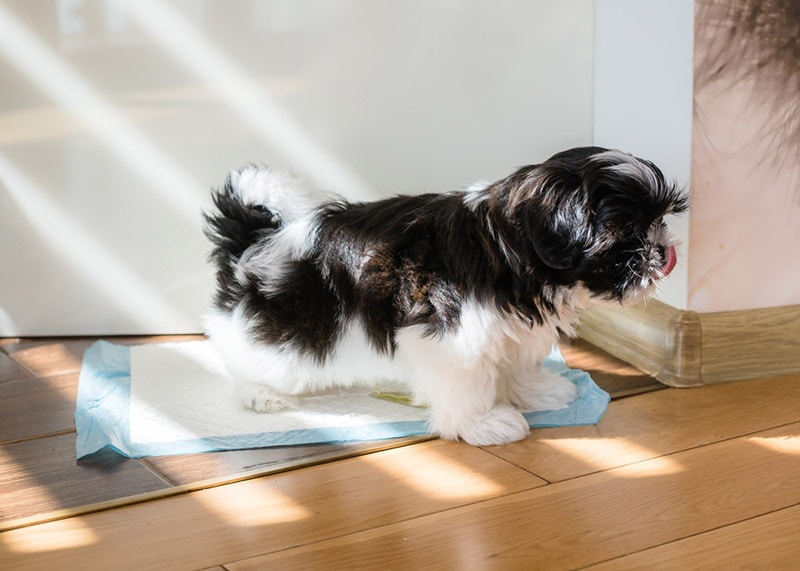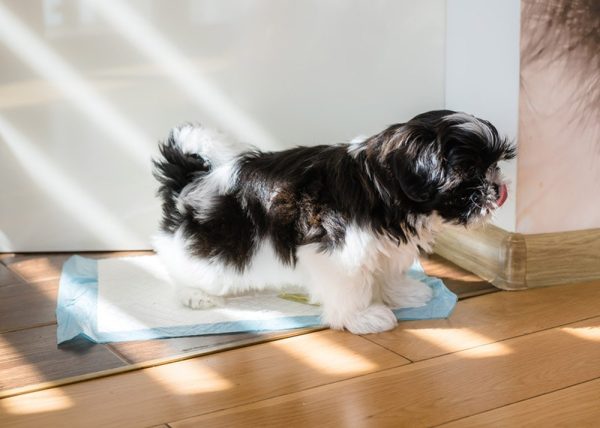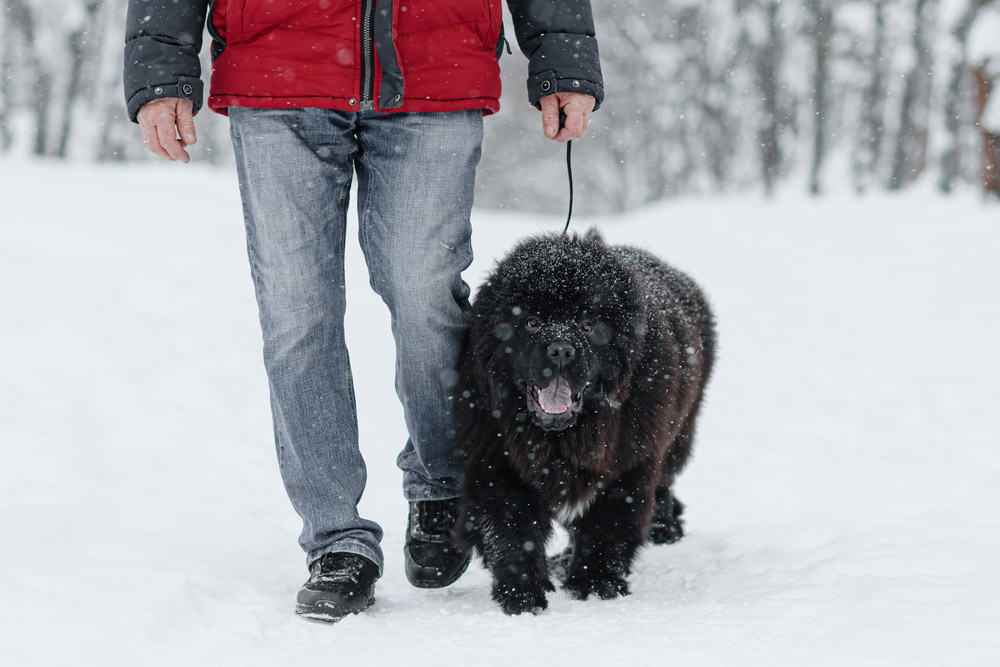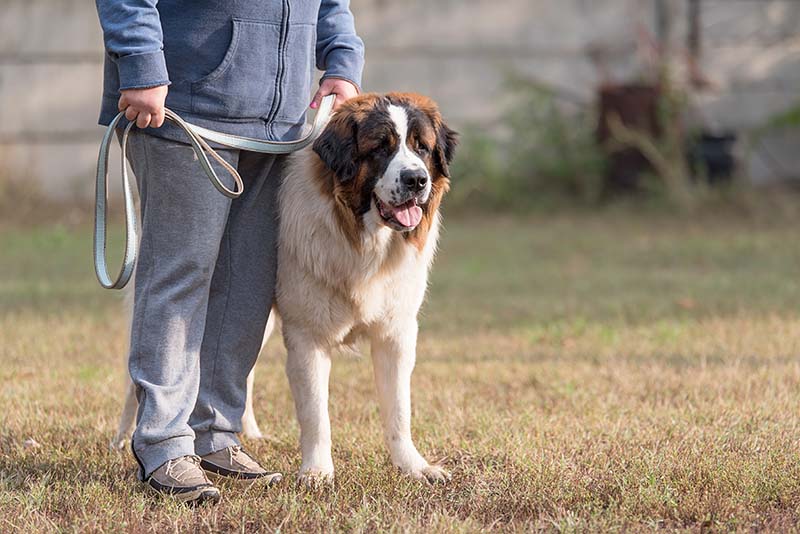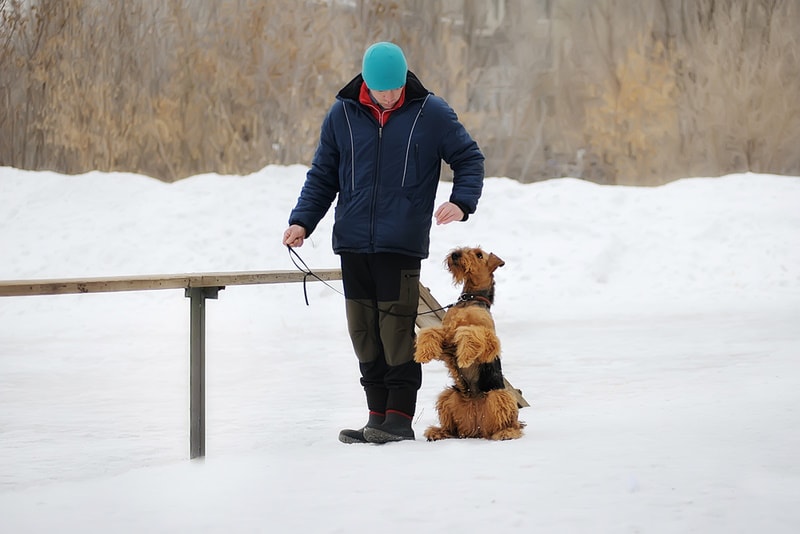Shih Tzus are spunky little dogs with big personalities that can warm the heart of any human being they meet. They also happen to be quite smart, which is beneficial when it comes to things like teaching them life skills. All Shih Tzus are perfectly capable of learning the rules of potty training.
However, it is our responsibility as pet owners to teach them when and where to go potty. Of course, we don’t have full control over a Shih Tzu’s bladder and bowel movements. However, we can teach our dogs how to tell us when they need to go potty and where to go when the need arises. Here are 10 expert tips and tricks that you can use to make the potty training process more enjoyable and successful overall.
The 10 Tips to Potty Train Your Shih Tzu
1. Create a Potty Schedule to Follow
The most important thing that you can do to help with potty training your Shih Tzu is to create a potty schedule. This will help ensure that your dog has the opportunity to use the bathroom regularly, as they won’t initially know how to tell you. The following should be considered when planning a potty schedule:
- Most puppies need to relieve themselves soon after they eat a meal or drink water.
- Many puppies feel the need to relieve themselves after a heavy session of playing and roughhousing. The high activity tends to get bodily functions going.
- Almost all puppies must relieve themselves shortly after waking up from a night’s sleep or a long nap.
- Plan on taking your puppy out in intervals no longer than their age in months. For example, a 3-month-old puppy should be taken out every 3 hours.
- If you are taking your puppy outside for potty breaks, please remember that young puppies that have not yet received a full vaccination schedule should be kept away from direct contact with other pets. Keep a close eye on your puppy.
While your dog should learn how to let you know when it’s time to go outside, if you adopt a potty schedule throughout their life, they may never need to do so.
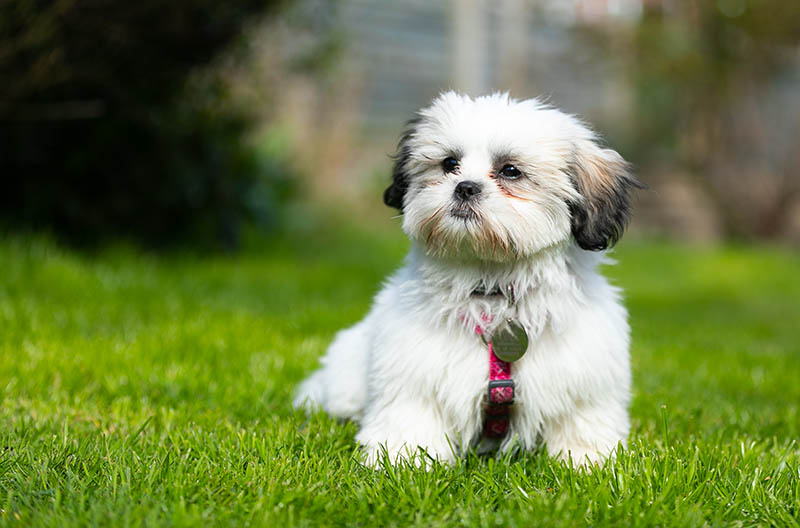
2. Think of It Like Potty Training a Toddler
The thing about puppies like Shih Tzus due to their size is that they are just like 2-year-old toddlers when it comes to potty training. When they have to go to the bathroom, they have to go! They do not understand the concept of “holding it,” as older kids and dogs do. So, while you should have a potty schedule in place, expect to break the schedule with unanticipated bathroom breaks. You can’t expect your little one to hold it for more than a minute or so once they start showing signs of needing to use the bathroom.
3. Look for Signs That a Potty Break Is Needed
Puppies often show signs that they need to use the bathroom before they actually go. You just need to know what signs to look for in the first place.
- Sniffing the Floor — When a puppy has to use the bathroom, they tend to start sniffing around for a good place to go. You might notice them sniffing around the edge of the couch or near an exterior door.
- Pacing in Circles — When a puppy feels the need to use the bathroom but doesn’t know where to go because they know that they’re supposed to go outside, you might spy them pacing in circles to try to get rid of their potty anxiety while they look for an appropriate spot.
- Squatting — Both male and female puppies might squat down to get into position for using the bathroom. There is not much time to get them outdoors once they start doing this, as the action means they are ready to go!
Take your dog out as soon as you spot any signs of them needing to use the restroom. If you wait too long, it could result in an accident inside the house and unnecessary frustration for everyone involved.
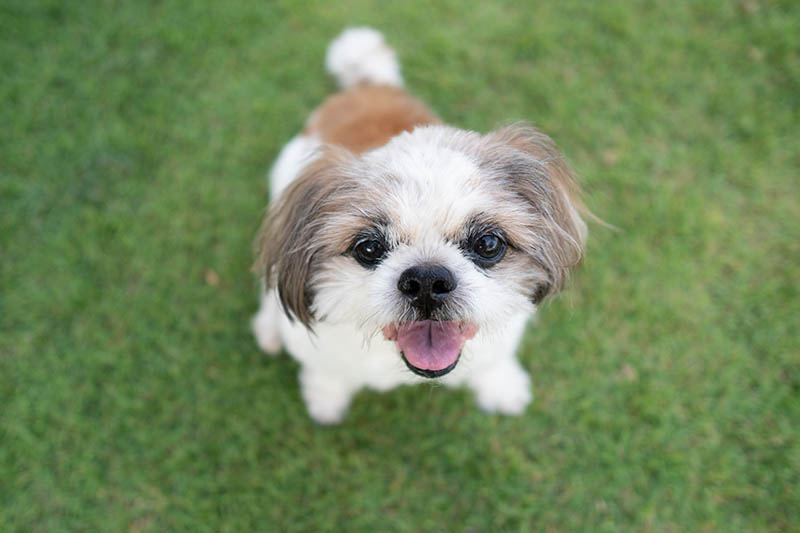
4. Establish “Official” Potty Locations
Even though your dog can go potty just about anywhere outdoors, it is a good idea to establish specific locations both outside and indoors (if you’ll be allowing such behavior there) so they know where to go when the time comes. Establishing a place or two to go outside will make it easier for you to clean up after your dog and ensure that they understand where they are expected to go when they head outside for a potty break.
Establishing a potty location indoors will help ensure that no accidents happen on the carpet and furniture. Place potty pads on the floor wherever you want them to go, and then train them in what the pads are for. You may have to take the pads outside where your dog’s potty areas are so they can understand what the pads are supposed to be used for inside the house.
5. Adopt “Potty” Language
It’s a good idea to adopt language that is specific to potty breaks so you can effectively communicate with your dog as they grow from puppyhood into adulthood. Phrases such as “let’s go potty” and “potty break” will signal to your dog that it’s time to go outside and take care of business.
After a while, your pup will understand the phrases and head right to the door whenever you use them. You can utilize potty language while on walks and adventures outdoors to signal when it’s a good time for your dog to relieve themselves. Eventually, your dog will likely relieve themselves anytime you use the potty language, which will come in handy when it’s late at night and the weather isn’t so nice outside.
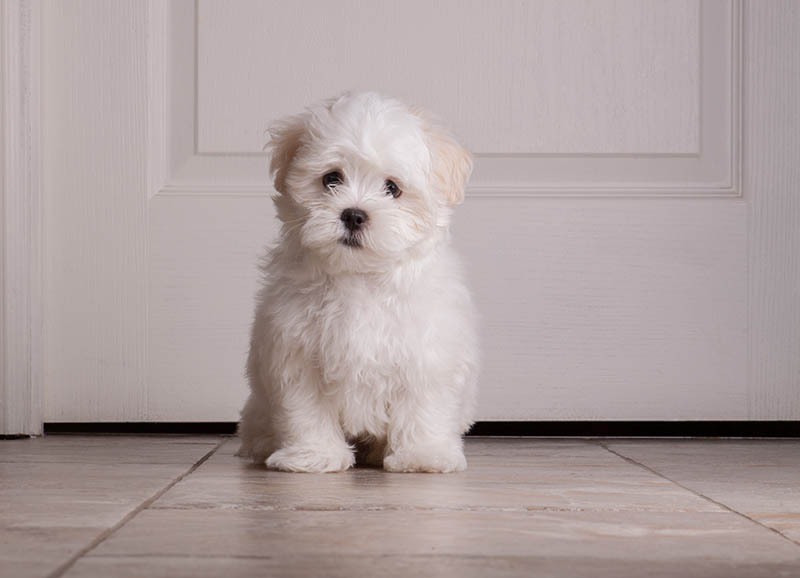
6. Consider Crate Training
Training your dog to hang out in a crate is a great way to keep them from using the bathroom in the house where you least want them to. Whether you must be away for a couple of hours of work tasks or run to the grocery store, the last thing that you want is a puppy that isn’t fully potty trained to have full reign of the house without supervision.
Dogs don’t want to relieve themselves in an area where they must spend their time. Being in the crate, they are more likely to hold it until you get home and can take them outside for a potty break. Being in a crate while you’re away can also help relieve separation anxiety, which Shih Tzus are prone to and can lead to bathroom accidents. The less stress experienced, the fewer potty accidents there will be to contend with.
7. Always Praise Good Potty Behavior
Negative reinforcement, including yelling at or scolding your dog for having a potty accident, can result in even more accidents. Positive reinforcement will encourage your puppy to learn the rules and let you know when they need to go outside for a pee or poop break. Therefore, it’s a good idea to forego the yelling and opt for praise instead. Consider giving your dog a small treat whenever they follow the potty rules or praising them with loving words and snuggles.
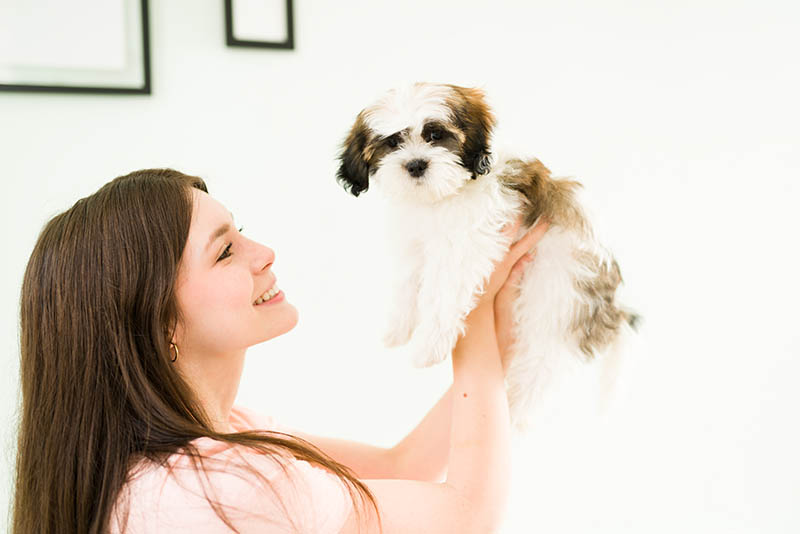
8. Keep an Eye Out for Signs of Bladder Infections
If your puppy gets a bladder infection, they may start to have accidents in the house, and it can seem like they are regressing in their potty training. The problem is that a bladder infection can make it impossible to hold it when the need to go has arisen. Make sure to schedule regular veterinarian checkups, and keep an eye out for signs of a bladder infection:
- Straining to urinate
- Bloody urine
- Urine that smells offensive
- Cloudy urine
- Reduced urine quantity during potty breaks
- Increased household accidents
If you notice any signs of a bladder infection, schedule an appointment with your veterinarian as soon as possible. They can diagnose the problem and prescribe treatments as necessary.
9. Clean Up Potty Accidents as Soon as Possible
Cleaning up potty accidents as soon as they happen or as soon as you possibly can, will help deter your dog from going potty in that spot again. The longer that urine stays on flooring, the more opportunity it has to seep into that flooring, whether it’s wood, carpet, or laminate.
If you clean it up quickly, it won’t have an opportunity to seep in, so your pup won’t smell it embedded in the floor and assume that it’s a safe place to relieve themselves. The quicker you clean up accidents, the better your home will smell too.
You can spray a concoction of white vinegar, warm water, and baking soda on the accident area to neutralize the scents and avoid the encouragement of peeing there. The spray can help neutralize other bad odors in the home too.
No matter how hard you try, pets will always leave you cleaning up smells, stains, vomit, hair, and everything in between. With the Hepper Advanced Bio-Enzyme Pet Stain & Odor Eliminator Spray, you can advance your clean-up routine!
- ADVANCED ENZYMATIC CLEANER - Penetrates the most stubborn smells and stains at the deepest molecular...
- FOR ANY MESS, ON ANY SURFACE - This pet odor eliminator cleans your carpets, floors, furniture,...
- FRESH, NATURAL ODOR - Our unique formulation doesn't rely on dangerous or unpleasant chemical...
It permanently removes the very worst pet stains and smells (and truly makes clean-up a breeze). Click here to learn more, order a bottle, and freshen up your home today.
At Dogster, we’ve admired Hepper for many years, and decided to take a controlling ownership interest so that we could benefit from the outstanding products of this cool pet company!
10. Remember That Consistency Is Essential
Consistency is the key to successful potty training for your Shih Tzu. If you falter in the process, it can set you back and create a frustrating situation that is hard to progress from. Be consistent with your words, actions, and praises to ensure the best outcome from your potty training efforts.
Make sure you’re on time with the potty schedule. Praise your dog in the same way each time. Clean up consistently. Use the same potty phrases throughout the day. Dogs are creatures of habit, so they rely on us humans to maintain consistency for them. It will give your dog the confidence that they need to take their potty training seriously and make accomplishments that result in praise.
Summary
There are various ways to potty train your Shih Tzu, and hopefully, the tips and tricks outlined here will help you succeed no matter what training methods you choose to implement. Professional help can be sought via in-person training sessions, instructive DVDs, and online lessons. Shih Tzus can be stubborn, so consistency and patience are crucial to achieving success.
Featured Image Credit: Ilina Yuliia, Shutterstock
Contents
- The 10 Tips to Potty Train Your Shih Tzu
- 1. Create a Potty Schedule to Follow
- 2. Think of It Like Potty Training a Toddler
- 3. Look for Signs That a Potty Break Is Needed
- 4. Establish “Official” Potty Locations
- 5. Adopt “Potty” Language
- 6. Consider Crate Training
- 7. Always Praise Good Potty Behavior
- 8. Keep an Eye Out for Signs of Bladder Infections
- 9. Clean Up Potty Accidents as Soon as Possible
- 10. Remember That Consistency Is Essential
- Summary

